Battle of the Bachelors:
AB versus BSE
“What do those funky initials mean, anyway?”
AB is for Bachelor of Arts, and BSE is for Bachelor of Science in Engineering. They are the two undergraduate degrees offered by Princeton. (Yes, most other places would call the Bachelor of Arts a BA, but this is Princeton after all.)
“Isn’t BSE a lot of work?”
In general, a BSE workload is heavier and more demanding than an AB one, especially in the freshman and sophomore years. This usually translates into problem sets for BSEs and pages of reading for ABs. The BSE load, however, is also more evenly distributed — four years of steady work rather than the AB mix of two easier years and two more frantic ones. The work distribution in AB and BSE courses also differs. Unlike most AB courses, in which grades depend primarily on two exams and one or more papers, engineering courses usually require work spread throughout the semester, with regularly scheduled labs, problem sets, and quizzes in addition to the midterm and final exams. Additionally, BSEs must take 36 courses to graduate, in contrast to 32 required for ABs. This naturally translates into more work for BSEs.
“Am I going to have a life?”
It all depends on how you play your cards, and how well prepared you are coming in.
“So what’s the good news?”
Engineers have no language requirement. Though many departments have design courses and core labs, there are also no junior papers. Also, BSE independent work can count as courses towards the required 36, while AB independent work can not. Independent work is an original piece of research, study, or design which is completed either individually or as a team member under the guidance of faculty members or other researchers.
“Are there any other differences?”
Engineers declare majors one year earlier (at the end of freshman year) and have more stringent requirements (36 courses). They participate in an advising system independent from the residential colleges.
“I’m not sure yet.”
If you take the requirements, especially the math and physics, you’ll leave your options open to switch in later. If you haven’t taken these courses by the end of freshman year, you’ve effectively chosen AB. Bear in mind that some courses are only offered in the fall, and others only in the spring.
Switching In
Should you want to switch into engineering, you may find the transition challenging but not impossible. The difficulty lies, as stated above, in making up the requisite freshman and sophomore engineering courses. You should certainly consult the Office of the Assistant Dean of Engineering for advice. Each year, some liberal arts students do successfully make the transition into the engineering school. However, be advised that switching in is much more difficult than switching out.
Switching Out
Should you discover that engineering is not for you, you may easily switch to a liberal arts program. The only hassles involved are a bit of paperwork and some course choice revisions to satisfy the AB requirements. Each year, some engineering students make this transition; it is not uncommon. Be aware that an AB program requires proficiency in a foreign language as well as coursework to fulfill additional distribution requirements. All in all, switching out is much easier than switching in.
“I’m not even taking any engineering courses yet. How am I supposed to decide if the BSE is really what I want to do?”
Reality suggests that your freshman courses may not give you an honest taste of the real engineering life. However, there are plenty of venues for exploring engineering outside the classroom. Talk with professors, grad students, and upperclassmen, visit the Science and Technology Career Fair this fall, or join one of the engineering organizations on campus to help evaluate your interests.
